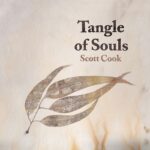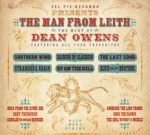 When you think that this is the year music went over the cliff (well, live music certainly) we’ve been pretty busy with album reviews as artists faced difficult choices about whether to release their material in a time when they couldn’t tour to promote it. Despite those difficult decisions, we still reviewed over thirty albums this year and we asked Allan to pick out five of his personal favourites.
When you think that this is the year music went over the cliff (well, live music certainly) we’ve been pretty busy with album reviews as artists faced difficult choices about whether to release their material in a time when they couldn’t tour to promote it. Despite those difficult decisions, we still reviewed over thirty albums this year and we asked Allan to pick out five of his personal favourites.
I’ve always loved the MusicRiot ethos of reviewing; it’s not about trashing albums that we aren’t keen on, it’s about highlighting the albums that we really like and telling the world why we like them. We don’t review high profile albums, nothing we say will help Springsteen, Dylan or Young sell half a dozen more units, but we might actually help someone self-releasing their work, even if it’s only with a quote to use on their next press release. Now I’ve got that out of my system, I’ll tell you about five albums that I’ve had on high rotation this year. As always, in no particular order:
 “What in the World” – Michael McDermott
“What in the World” – Michael McDermott
Michael McDermott keeps cropping up in these year end lists, with good reason. He’s a great songwriter and he knows how to present his songs on record and live. “What in the World” was a bit of a departure for Michael; his focus has shifted towards protest songs. When Michael takes a pathway, he commits to it completely. The title song is “Subterranean Homesick Blues” for 2020; it’s a headlong rush through the final year of Trump’s presidency and pulls no punches – ‘It’s not hard to see The President’s a criminal’. While “What in the World” is one of only two protest songs on the album (the other is “Mother Emanuel”), its power and ferocity mean that it defines the album, although there are plenty more songs from Michael’s post-addiction and recovery space to make a great and varied album.
This one was very different from the MusicRiot staples. Maya Rae isn’t the kind of artist we usually hear about from our sources. She sent a demo tape to producer Steve Dawson (Black Hen Records) and he hastily put a band together to record the album in three days. Maya wasn’t even eighteen at the time and she had already been singing professionally for six years. The album’s fresh and zingy and full of the insights about young people’s lives that you can only get from a young person. The musicianship on the album is superb as the band step effortlessly from pop to sinuous funk. Try it, you’ll love it.
I don’t think I’ve ever featured an entirely instrumental album before in my High Fives, but I’d never heard “Iago Banet” before this year. Iago plays in a style that he describes as Galician finger-style from south, south, south, south London. If you haven’t seen Iago play live you would think that each song features at least two guitarists (a bit like Martin Harley’s Weissenborn playing), but only one track on the album features a second guitar and that’s the fun blues hybrid ”Octopus One”. Iago’s playing evokes pictures ranging from Greater London scenes (“Morning at Greenwich Park”) to more prosaic domestic scenes (“There’s a Mouse In my Kitchen”). And there’s also a wonderful swing arrangement of Van Morrison’s “Moondance”. What more could you want?
 “Tangle of Souls” – Scott Cook
“Tangle of Souls” – Scott Cook
To paraphrase the Marks & Spencer advertising strapline, this isn’t just music. “Tangle of Souls” as a standalone album is a superb piece of work, but it comes packaged with a hefty booklet containing Scott’s writings, printed on had-crafted paper. It all adds to the experience, but the album stands on its own musical and lyrical merits. The album’s centrepiece “Say Can You See” is a political statement that isn’t partisan; it’s about not trusting anyone from the DC elite. The album has more of a political edge than some of Scott Cook’s earlier work, including an update of Dick Blakeslee’s “Passin’ Through”, which includes a reference to 1970s Chilean martyr Victor Jara. It’s an album that will make you listen and make you think.
 “The Sleepless Kind” – Andy Fleet
“The Sleepless Kind” – Andy Fleet
This was another one that came out of left field. Andy is a musician who makes a living in the same way as a lot of musicians these days; a bit of performance, a bit of recording, a bit of teaching and a bit of anything else that comes along. “The Sleepless Kind” tells the stories of the musicians who entertain us in our clubs and bars every night (or did before the onset of this plague) and gives us a unique perspective on Soho through the eyes of an owl. It’s an album that rewards repeated plays and has an end of the day feel to it. You should probably listen while nestling a single malt in one hand.
And here’s a little bonus ball for you. I wouldn’t normally include a compilation in this selection, but this one merits a mention.
 “The Man from Leith” – Dean Owens
“The Man from Leith” – Dean Owens
This is a seventeen-song Dean Owens retrospective. I’ve followed Dean’s work for nearly ten years now and he’s a songwriter who writes beautifully about Scottish and global themes. There are songs about family, songs about friends, songs about events and even a sing inspired by Ronnie Lane. If you want an introduction to Dean’s body of work, then this is the perfect place to start. And whether he’s playing solo or with a band you should try to see him live as well.
 The last album from Scott Cook to hit my inbox was 2016’s “Go Long”, which shone a beam on the more light-hearted side of Scott’s songwriting. He described it as ‘a bunch of silly songs’, which didn’t entirely do it justice, because it had its serious moments and it was actually a great bunch of songs, whatever the flavour. “Tangle of Souls” is a very different proposition; it was written following a brush with the reaper and reflects the re-evaluation following that experience as well as other, happier, life events. Also, Scott Cook’s a philosopher and an idealist; it shouldn’t be surprising that there’s a sprinkling of social comment on the album as well. There are a lot of targets out there in 2020 and Scott firmly sets his sights on quite a few of them.
The last album from Scott Cook to hit my inbox was 2016’s “Go Long”, which shone a beam on the more light-hearted side of Scott’s songwriting. He described it as ‘a bunch of silly songs’, which didn’t entirely do it justice, because it had its serious moments and it was actually a great bunch of songs, whatever the flavour. “Tangle of Souls” is a very different proposition; it was written following a brush with the reaper and reflects the re-evaluation following that experience as well as other, happier, life events. Also, Scott Cook’s a philosopher and an idealist; it shouldn’t be surprising that there’s a sprinkling of social comment on the album as well. There are a lot of targets out there in 2020 and Scott firmly sets his sights on quite a few of them.
Let’s just take a step away from this particular album for the moment to look at albums in general. There’s a school of thought that the album is dead (particularly in CD form) and that a series of singles is the best way to capitalise on your work. Which might work if you rely on streaming or downloads for income; for artists who tour a lot in smaller venues an album or EP to sell at the merch desk is a great way to generate income without the hassle of distribution. What Scott has done with this album (and, to a lesser extent 2017’s “Further Down the Line”) is to go back to an earlier time when the music was only part of the album-buying experience. If you’re of a certain vintage, you’ll remember buying the album and checking out the artwork, credits, sleeve notes and lyric sheets, probably on the bus home. It built up the anticipation before you got the chance to play the album. What Scott’s done with “Tangle of Souls” takes this a few stages further. The album includes a two hundred and forty-page booklet which includes credits, lyrics, chords for the songs, the inspiration behind, and explanation of the songs and some of Scott’s biographical, historical and philosophical writings. It’s even printed on specialist paper with hand-drawn artwork. That’s got to be better than a thumbnail of the artist as you listen to a stream or a download (and yes, I did read all of it, it would have been rude not to).
So to the songs. There are twelve of them and each one of them is memorable, and several of them, for me, are classics. “Just Enough Empties” contrasts a gentler, not-too-distant past, with a lonely and alienated present through one person’s journey down a road of innocence, awakening, degradation and redemption linked by the practical idea of glass bottle recycling; it’s a beautifully-crafted song. “Say Can You See”, with the obvious reference to the “Star-Spangled Banner” in the title, is built around a string band arrangement and is Scott’s most overtly political song so far. It’s political, but in a non-partisan way; the message is that virtually everyone on the Hill (Republican or Democrat) is the enemy of the working people and that draining the swamp should actually flush away all of them (‘It ain’t about right and left, it’s about right and wrong’). Those two songs alone would make this a five-star album for me, but there’s even more.
“Passin’ Through” was written by Dick Blakeslee in the forties and it’s one of those songs that lends itself to verses being changed or added. The narrative structure could have inspired the Stones’ “Sympathy for the Devil”; Jagger says it was something from Rabelais, but he would say that, wouldn’t he? Scott adds his own verse to the song with a tribute to Victor Jara, the Chilean activist beaten and executed by Pinochet’s thugs in the Santiago Estadio Nacional in 1973. This song attracted my attention even more because, coincidentally, the Manic Street Preachers’ James Dean Bradfield has recently released an entire album dedicated to Victor Jara (“Even in Exile”). It’s worth checking that out as well.
The last of my personal picks is “What to Keep”, a slow piece that interweaves the personal and political in an exploration of the physical and mental baggage that we carry with us as individuals or as nations. The message is that there are always things that weigh us down that we should cut loose to lighten our load, whether it’s personal memorabilia or inappropriate public commemorations of bygone eras; the less you carry, the easier it is to move forward. The remaining seven songs and one instrumental are all superbly crafted and delivered, and packed with interesting and thought-provoking ideas, but I’d like you to listen to some of the album without the dubious benefit of my opinion.
“Tangle of Souls” is an important work from the wider Americana scene this year. It’s a deeply-considered view of individuals and society twenty years into the twenty-first century; the narratives aren’t necessarily cheerful, but the overall message is positive, in line with Scott’s personal outlook after some challenging times (which you can read about in the book).
“Tangle of Souls” is released in the UK on Friday October 9th.
 How long is it since you heard a good song that was funny, or even a funny song that was good? One that wasn’t just whimsical and that you could maybe bear to listen to a second time around? There was a period in the seventies when Loudon Wainwright III, Warren Zevon and the brilliant Shel Silverstein turned out some hilarious songs alongside the serious stuff, but what’s happened since? Well, here’s the good news, it looks like Scott Cook can carry on the tradition. He’s a gifted songwriter, fizzing with boldness and ingenuity, writing about the environment, responsibility, commitment and the world stubbornly refusing to end according to anyone’s timetable. Scott describes “Go Long” as ‘a bunch of silly songs’ that were recorded live in the studio with a few overdubs and corrections later, giving it a fresh and spontaneous feel that works perfectly for the songs.
How long is it since you heard a good song that was funny, or even a funny song that was good? One that wasn’t just whimsical and that you could maybe bear to listen to a second time around? There was a period in the seventies when Loudon Wainwright III, Warren Zevon and the brilliant Shel Silverstein turned out some hilarious songs alongside the serious stuff, but what’s happened since? Well, here’s the good news, it looks like Scott Cook can carry on the tradition. He’s a gifted songwriter, fizzing with boldness and ingenuity, writing about the environment, responsibility, commitment and the world stubbornly refusing to end according to anyone’s timetable. Scott describes “Go Long” as ‘a bunch of silly songs’ that were recorded live in the studio with a few overdubs and corrections later, giving it a fresh and spontaneous feel that works perfectly for the songs.
There are some ‘serious’ songs on the album (“Sweet Maddie Spawton”, “Come This Far”, “That’s Life (Loving You Right Back)” and “While the Party’s Still Going) but the remainder often look at serious subjects through a humorous filter. “Talkin’ Anthropocalypse Blues” typifies this, with a breakneck run through a few inaccurate Armageddon predictions before bringing the song back to the need to take responsibility for our planet, rather than waiting for someone to do it for us. It rattles along like Johnny Cash’s “A Boy Named Sue” (written by Shel Silverstein) with barely a chance to draw breath as the failed apocalypse predictions are serially skewered. “I Live Down Here” sounds like a children’s singalong, with a simple structure, lots of repeated lines and opportunities for audience participation but with a powerful environmental message permeating the nonsense verses.
And some are just funny. The album opens with the sound of a ringpull and the line ‘Judging by the angle of the sun, I’d say it’s beer o’clock” as the band rambunctiously stomp through “Long Weekends Theme”, while “Will the Circle be Unbroken” pokes fun at songs that are past their sing by date; both songs made me laugh out loud on the very first listen, even on a very bad day. “Lifer for a Wifer”, about the impossibility of relationships on the road, is packed with great lines, including ‘And if she can diddle the big bass fiddle, I’ll be wrapped around her strings’.
The sleeve notes suggest that this is a frivolous departure from the main themes of Scott Cook’s songwriting, and while it’s true that there’s plenty of fun on offer, more often than not there’s a serious message lurking. This is an album that will make you smile, probably make you laugh out loud, and should make you think. You don’t often find one of those.
“Go Long” is released on Friday July 8th on Groove Revival (GRP 007).
The sleeve notes also have lyrics, guitar chords and helpful hints from Scott about how he actually played the songs.




